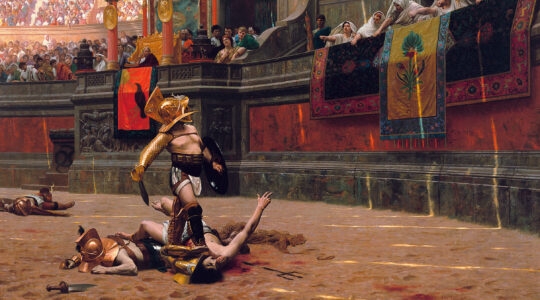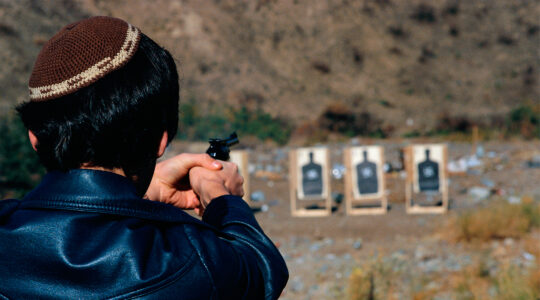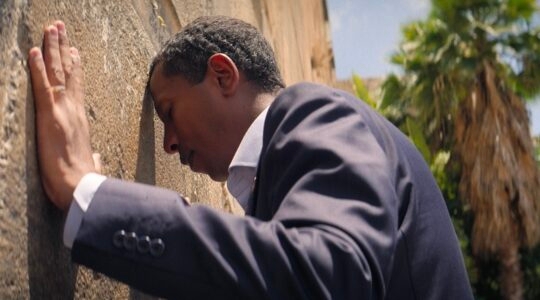SYDNEY (JTA) – Like Primo Levi and Elie Wiesel, Rafael Rajzner was one of the few Holocaust survivors who chronicled his traumatic experience in the years soon after the war, when most survivors stayed silent.
But unlike those authors, Rajzner’s harrowing, 324-page eyewitness account of the liquidation of Bialystoker Jewry was never translated into English. His memoir, “Der Umkum Fun Byalistoker Yidntum” (“The Annihilation Of Bialystoker Jewry”), was published in Melbourne in Yiddish in 1948. It was the first memoir by a Holocaust survivor published in Australia.
Now, however, the book has come out in English.
Rajzner, who survived Auschwitz but lost his entire family, was one of the counterfeiters at Sachsenhausen made famous by the 2008 Academy Award-winning movie “The Counterfeiters.”
The largest city in northeast Poland, Bialysok was once home to 60,000 Jews, only about 1,000 of whom survived the Nazis. Rajzner was one of them.
When he died in 1953 at age 56, all hopes evaporated that his work, scribbled into notebooks at war’s end, would ever be translated into English.
Sixty years on, the English translation was launched at the Melbourne International Writers’ Festival on Aug. 24; a documentary about the book will be screened on Australian TV on Oct. 12.
The translation was the brainchild of Henry Lew, born in the Bialystok Center in Melbourne, a way-station for Jewish refugees, around the exact time Rajzner’s book was published in 1948.
“I have no doubt that had Rajzner still been alive, and had it been translated in 1960 or 1961, it would have become a very famous book,” Lew told JTA. “Nobody looked at Primo Levi or Elie Wiesel until the 1960s.”
Levi’s book, “If This is a Man,” was first published in 1947 in his native Italian. It took Wiesel until the mid-1950s to complete his first version of “Night,” which was published in Yiddish. Neither book was widely read until they were translated into English.
Lew was first introduced to Rajzner’s book in 2001 by his 95-year-old father, Leo, a Bialystoker who said he regretted that Rajzner’s book didn’t reach a wider audience.
“Rajzner told my father how a lot of his family died,” Lew said. “When he died in 2002, I found the book.”
Lew’s Yiddish was not good enough to translate it, but the idea percolated at the back of his mind for a couple of years until he stumbled across Aaron Lansky’s book, “Outwitting History,” which describes how a secular Jewish student devoted his life to retrieving Yiddish books.
“I was very inspired by Lansky’s book,” says Lew, who emailed the author in 2004 for names of Yiddish translators. Lansky provided 55 names, all of whom received a letter from Lew asking if they would translate 10 pages of Rajzner’s book.
Lew amassed an army of 22 “righteous translators” from the United States, Canada and Australia.
One of them, Mindle Crystel Gross, from Florida, had never heard of Rajzner. But she agreed to help when she learned about the memoir.
“It was absolutely necessary to have his memoir translated into English, especially because it was an eyewitness account,” she says.
Another translator, Rabbi Edward Zerin, from San Francisco, is the son of a Bialystoker who left Poland before World War I.
“All such stories need to be told,” he said. “We dare not forget.”
A third translator, Jack Berger, from New Jersey, a former vice president of Citibank, has translated similar books. “It isn’t easy,” he says. “Sometimes, you have to stop, walk away and come back days later.”
Arnold Zable, an award-winning Australian author whose father was a Bialystoker, is promoting the book, which Lew self-published under the title “The Stories Our Parents Found Too Painful to Tell.”
Rajzner told Zable’s father that he witnessed his parents being shot into a mass grave.
“My father said it was unbearable, but he was so grateful he had an eyewitness account,” Zable says, noting that the book lists more than 200 names of Bialystokers. “He lists names. He’s named the streets. It’s a kind of Schindler’s List in that way. It’s got that personal aspect to it. He was bearing witness. It’s an extraordinary document.”
Lew, an opthalmologist who has written three other books, says the project took four years.
“I started another book on Bialystok based around my family,” he says. “But I put it aside because I wanted the translators to be alive by the time Rajzner’s translation was finished.”

Help ensure Jewish news remains accessible to all. Your donation to the Jewish Telegraphic Agency powers the trusted journalism that has connected Jewish communities worldwide for more than 100 years. With your help, JTA can continue to deliver vital news and insights. Donate today.





